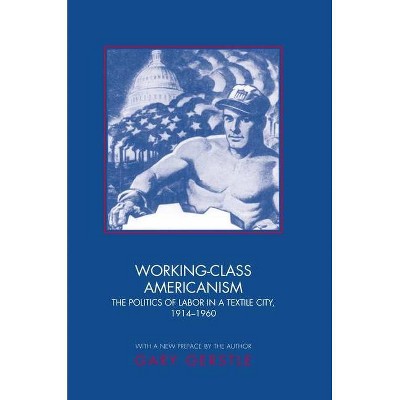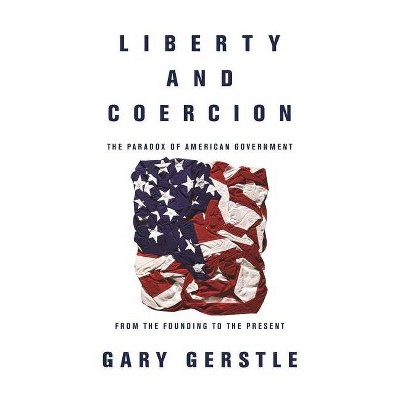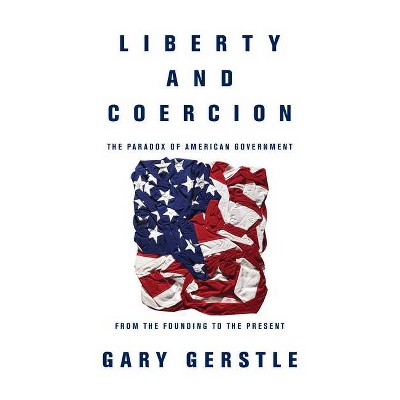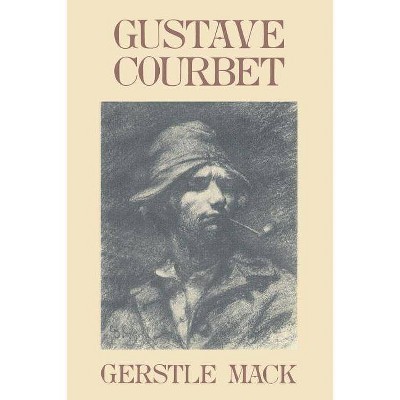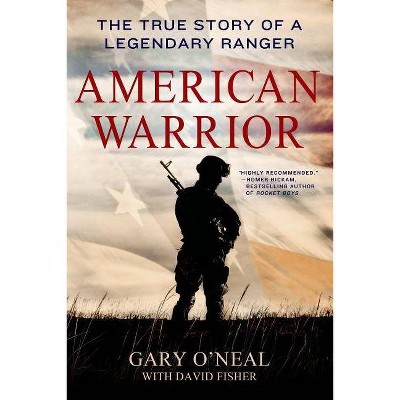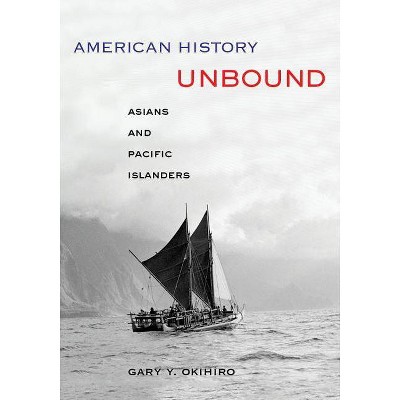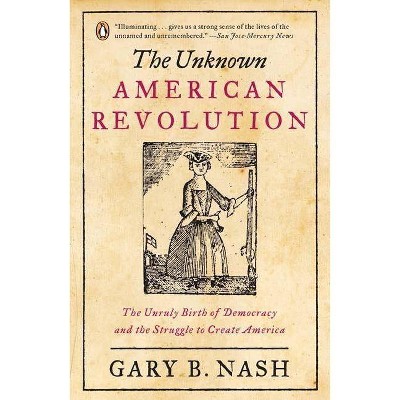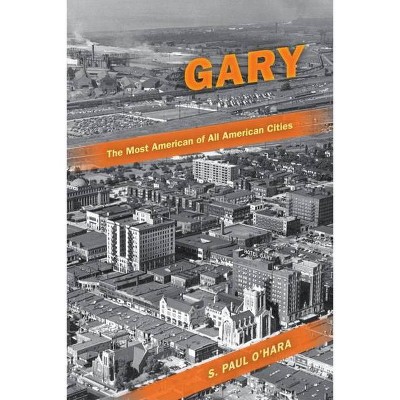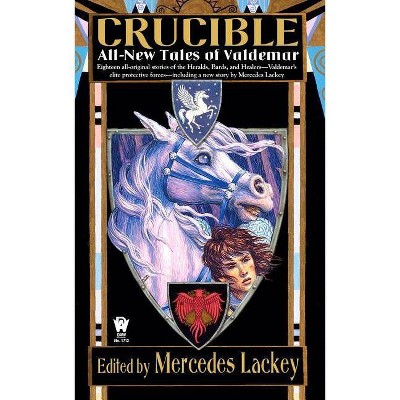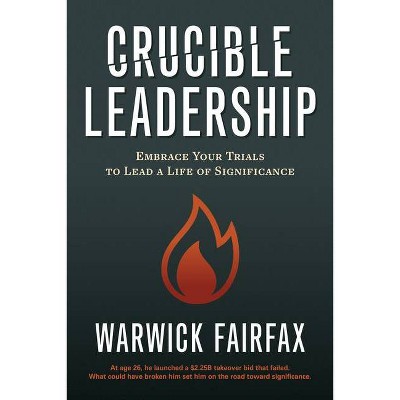American Crucible - by Gary Gerstle (Paperback)
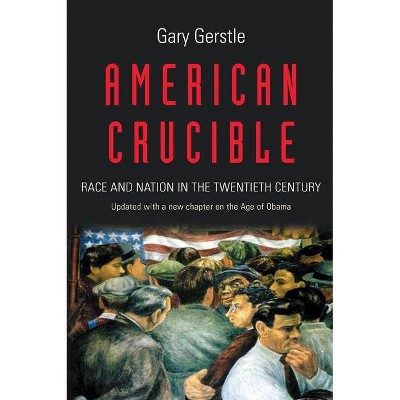
Similar Products
Products of same category from the store
AllProduct info
<p/><br></br><p><b> About the Book </b></p></br></br>"Updated with a new chapter on the Age of Obama."--Cover.<p/><br></br><p><b> Book Synopsis </b></p></br></br><p>This sweeping history of twentieth-century America follows the changing and often conflicting ideas about the fundamental nature of American society: Is the United States a social melting pot, as our civic creed warrants, or is full citizenship somehow reserved for those who are white and of the right ancestry? Gary Gerstle traces the forces of civic and racial nationalism, arguing that both profoundly shaped our society. <p/> After Theodore Roosevelt led his Rough Riders to victory during the Spanish American War, he boasted of the diversity of his men's origins- from the Kentucky backwoods to the Irish, Italian, and Jewish neighborhoods of northeastern cities. Roosevelt's vision of a hybrid and superior "American race," strengthened by war, would inspire the social, diplomatic, and economic policies of American liberals for decades. And yet, for all of its appeal to the civic principles of inclusion, this liberal legacy was grounded in "Anglo-Saxon" culture, making it difficult in particular for Jews and Italians and especially for Asians and African Americans to gain acceptance. <p/> Gerstle weaves a compelling story of events, institutions, and ideas that played on perceptions of ethnic/racial difference, from the world wars and the labor movement to the New Deal and Hollywood to the Cold War and the civil rights movement. We witness the remnants of racial thinking among such liberals as FDR and LBJ; we see how Italians and Jews from Frank Capra to the creators of Superman perpetuated the New Deal philosophy while suppressing their own ethnicity; we feel the frustrations of African-American servicemen denied the opportunity to fight for their country and the moral outrage of more recent black activists, including Martin Luther King, Jr., Fannie Lou Hamer, and Malcolm X. <p/> Gerstle argues that the civil rights movement and Vietnam broke the liberal nation apart, and his analysis of this upheaval leads him to assess Reagan's and Clinton's attempts to resurrect nationalism. Can the United States ever live up to its civic creed? For anyone who views racism as an aberration from the liberal premises of the republic, this book is must reading. <p/>Containing a new chapter that reconstructs and dissects the major struggles over race and nation in an era defined by the War on Terror and by the presidency of Barack Obama, <i>American Crucible</i> is a must-read for anyone who views racism as an aberration from the liberal premises of the republic.</p><p/><br></br><p><b> From the Back Cover </b></p></br></br><p>"Historians and social scientists have been longing for ambitious syntheses that take into account recent contributions to social history and studies of culture while reinvigorating key themes in political history. This book's rich and learned assessment of the complexities of twentieth-century America and its appraisal of change provide just such a powerful diagnostic and temporal framework. Showing how civic and racial ideals have entwined to produce both expansive and restrictive results, <i>American Crucible</i> is thoughtfully instructive and lovely to read."<b>--Ira Katznelson, Ruggles Professor of Political Science and History, Columbia University.</b></p><p>"Fifty years ago, prominent historians celebrated the virtues of the 'American Creed' thirty years ago, their successors deplored the evils of 'Amerikka.' The best contemporary historians transcend these stereotypes by analyzing the many facets of Americanism, and <i>American Crucible</i> now sets the standard for the others. Its demonstration of how civic nationalism and racial nationalism change and how they change each other, its smooth movement from high diplomacy to comic strips, its refusal to settle for easy condemnation or celebration-together they add up to a terrific achievement."<b>--Jennifer Hochschild, Harvard University</b></p><p>"In <i>American Crucible</i>, Gary Gerstle traces the fundamental tension between the American belief in equality and the deeply rooted tradition of racial nationalism-the most significant and most sustained conflict throughout the history of the United States. Gerstle's angle of vision allows him to illuminate and place in larger context such seemingly diverse events and developments as World War I and multiculturalism, immigration policy and the Christian right, Teddy Roosevelt's reform agenda and the social upheavals of the 1960s. <i>American Crucible</i> provides invaluable insight into the shape and structure of contemporary American society through its unique exploration of the nation's past."<b>--Thomas Byrne Edsall, <i>Washington Post</i></b></p><p>"This work confirms Gary Gerstle's stature as one of our most imaginative and ambitious historians. His scholarship substantially redefines the meaning of key ideas about the twentieth-century United States and its culture, including ethnicity, citizenship, patriotism, and Americanism. Gerstle's capacity for revisionism, synthesis, and engaged writing reminds me of Richard Hofstadter, C. Van Woodword, and Warren Sussman. With this book, he enters their league."<b>--Nelson Lichtenstein, University of California, Santa Barbara</b></p><p>"This is one of those rare works of political and cultural history that compel us to rethink the nature and evolution of American society as a whole."<b>--Michael Kazin, Georgetown University</b></p><p>"A bold, provocative, and often disturbing book about the contest between racial and civic definitions of American nationhood. Rarely has a work of scholarship examined the history of racism and exclusion in such comprehensive and dismaying detail, or in such clear and persuasive prose. Gerstle also contributes to the growing interest among historians in the concept of 'whiteness' by closely examining changing views of white ethnicity in the twentieth century. <i>American Crucible</i> is an important and impressive book and a major contribution to our understanding of twentieth-century America."<b>--Alan Brinkley, Columbia University</b></p><p>"<i>American Crucible</i> dramatically portrays the century just past as one in which the United States saw inclusive traditions of civic nationalism compete with and partake of exclusionary racial nationalist traditions. Meticulous research and deep reflection prevent Gerstle from portraying either nationalism as the 'real' American way. The tension between the two and between the author's sober analysis and his strong personal advocacy of civic nationalism produces a remarkable study. Organized accessibly around the nation building projects of the two Roosevelt presidencies, <i>American Crucible</i> ranges delightfully from dance halls to the halls of Congress, from comics to picket lines."<b>--David Roediger, Babcock Professor of History, University of Illinois</b></p><p>"<i>American Crucible</i> is the rare book that utterly transforms the way we view the familiar. With the sweeping yet agile brushstrokes of a great master, Gerstle paints a remarkable new portrait of the American nation on the vast canvas of the twentieth century. Guiding us from Teddy Roosevelt's charge up San Juan Hill to the debacle of Vietnam, he portrays a nation caught between two ideals-what he calls civic and racial nationalism-in constant struggle over whether the essence of American nationhood meant incorporation or exclusion."<b>--Lizabeth Cohen, Harvard University</b></p><p/><br></br><p><b> Review Quotes </b></p></br></br><br><i>American Crucible</i> is an illuminating addition to what has become a vibrant academic cottage industry, the study of nationalism. . . . [A] confident and elegantly written narrative.<b>---John T. McGreevy, <i>Chicago Tribune</i></b><br><br>[An] exemplary analysis.. . . Thanks to <i>American Crucible</i>, the nature of [the] complexities, contradictions, and burdens [of nationalism] are made clear.<b>---Susan Curtis, <i>American Nationalism</i></b><br><br>A model of clear writing . . . engaging and informative.<b>---Steven Goodson, <i>History: Reviews of New Books</i></b><br><br>Gerstle straddles the Old and the New Left, and this gives him a perspective that frequently makes for a fertile and unpredictable analysis.<b>---Peter Skerry, <i>National Journal</i></b><br><br>The publication of this book could not be more timely. The first eighty pages should be compulsory reading for anybody in the United Kingdom (and elsewhere) involved with immigrants or asylum-seekers, whether at the level of policy-making, policy administration, or merely as citizen hosts.<b>---Jim Potter, <i>Times Literary Supplement</i></b><br><br><p><i>American Crucible</i> is a valuable text for all students of the<br>twentieth century. Framed around a vital concept, it charts the ebb and flow of ethnic and civic strains in American life. . . . This engaging and clearly written book is also timely.</p><b>---Andrew M. Kaye, <i>Journal of American Studies</i></b><br><br>A brilliant interpretation of how ideas about race and national identity have defined the U.S. in the 20th century. . . . Engagingly written, wearing its historical learning lightly and combining pertinent cultural examples with political events, <i>American Crucible</i> is a work of profound historical originality and political significance that confirms Gerstle as the doyen among historians of Americanism.<b>---Desmond King, <i>Times Higher Educational Supplement</i></b><br><br>A fresh and accessible book that fully examines [a] fundamental American paradox. He has credibly and fascinatingly, traced the odd mixture of high ideals and base doubts that shaped race and immigration policy over the last century.<b>---Joseph Dolman, <i>The New Leader</i></b><br><br>A penetrating look at 20th-century America. . . . Highly recommended.-- "Choice"<br><br>An ambitious and provocative synthetic study. . . Gerstle's larger argument that race has been central to the definition of the American nation in the twentieth century is, ultimately, persuasive and should provoke considerable discussion on the historical character and boundaries of citizenship in the United States.<b>---Eric Arnesen, <i>The Journal of American History</i></b><br><br>The most probing and thought-provoking history of American nationalism ever written.<b>---James Green, <i>The Boston Globe</i></b><br><br>This informed and well-argued study is a strong addition to the literature on race, multiculturalism, and citizenship in the U.S . . . Gerstle [has] in this engrossing, powerfully argued study . . . a meticulous eye for detail.-- "Publishers Weekly"<br><br>This tightly argued historical synthesis is likely to be . . . influential to understanding the evolution of American nationalism in the past 100 years.-- "Library Journal"<br><br>Winner of the 2002 Theodore Saloutos Memorial Book Award<br><p/><br></br><p><b> About the Author </b></p></br></br><b>Gary Gerstle</b> is the Paul Mellon Professor of American History at the University of Cambridge and the author of <i>Liberty and Coercion</i> (Princeton).
Price History
Cheapest price in the interval: 22.49 on November 8, 2021
Most expensive price in the interval: 22.49 on December 20, 2021
Price Archive shows prices from various stores, lets you see history and find the cheapest. There is no actual sale on the website. For all support, inquiry and suggestion messages communication@pricearchive.us
